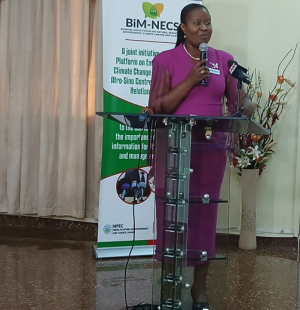…TheRivers are fading, farms are struggling, and future generations are forced to consume and drink the consequences of their forebears' actions.
By Professor Douglas BOATENG
It starts as a hole in the ground but ultimately becomes an open grave with polluted rivers, tainted farmlands, a public health emergency, and weakened national independence. Ghana's unlawful gold mining problem, referred to locally as Galamsey, has evolved far beyond a criminal economy. What began as small-scale panning has expanded into a shadow industry valued at a minimum of one billion dollars.
Equipped with excavators, mercury, drones, and outside funding, Galamsey has gone beyond causing environmental harm. It is eroding rural economies, weakening institutions, and threatening the future of Ghana's youth. Even after years of high-profile initiatives, such as Operation Vanguard, Halt, NAIMOS, and thousands of arrests since 2016, the damage continues. The machinery comes back. The rivers become darker. And the people keep enduring the hardship.The harsh reality is that the government cannot triumph in this conflict by itself.This goes beyond a law enforcement issue. It represents a societal breakdown, a lack of effective governance, and a humanitarian crisis that will affect the most vulnerable the hardest.
Dirty waters, polluted soil – the effects of the future
In the Eastern and Western regions of Ghana, rivers like the Birim, Pra, Ankobrah, and Offin are now carrying sludge, mercury, and cyanide. The Ghana Water Company has raised concerns that the nation might soon need to import clean water. Craters have taken the place of cocoa farms. Cattle herders are looking for safe areas to water their animals. Fishing communities catch silt. Wells provide water that is chemically polluted. When water is not safe to drink and soil is not fertile, no crops grow, no livestock survives, and no country can endure. Once a symbol of food and water security in the region, Ghana is now moving dangerously toward ecological bankruptcy.
Foreign influence, local support and secrecy
The most tragic irony is this: the worst offenders would never carry out such actions in their own nations. International-backed groups, typically more equipped than local police forces, breach Ghana's environmental standards in ways that would be impossible under the regulations of their home countries. However, they do not act alone. The unfortunate truth is that a network of local, intricate, and self-interested partners facilitates their activities:
- Citizensthose who remain quiet due to fear or monetary benefit
- Chiefs who lease sacred land
- Security officerswho ignore the situation
- Politicianswho gains from the earnings
The inconvenient truth –These external entities will leave with their pockets full. Ghana will be left with contaminated wells, deteriorating environments, and a generation that grows up sick. This is more than just illegal mining; it represents the commercialization of Ghana's spirit, being sold off piece by piece for another's prosperity.
The hidden expense – a significant long-term health issue emerging
In mining areas, clinics are observing a rise in mercury poisoning, breathing difficulties, pregnancy losses, and brain-related injuries, particularly affecting children and expectant mothers. These harmful substances won't be visible at voting booths, yet they will manifest in special education facilities, overburdened medical centers, and throughout families trapped in poverty. Galamsey is not only harming the land; it is subtly changing the country's biological makeup. This issue extends beyond rural zones; it represents a nationwide crisis. Ghanaians might not fully realize the consequences today, but in two decades, hospitals, educational institutions, and the economy will bear the weight of our inaction.
Crime cannot be addressed solely by the government.
The issue is not the intent. From President Kufuor's initial worries to President Mahama's instructions and President Akufo-Addo's promise to risk his presidency, and once more under President Mahama, administrations have attempted and keep striving their hardest. Operations have been initiated. Equipment has been confiscated. Declarations have been issued. Nevertheless, within a few weeks, the same locations resume operations.
Galamsey continues to exist not due to the absence of laws, but because it flourishes in the gaps between policies and their implementation, shielded by patronage, desperation, and silence. No bulldozer can remove complicity. No single law can eliminate deep-rooted indifference. The true battle is about civic ethics and shared bravery. This issue will not be addressed from Accra. It needs to be confronted in the villages, churches, schools, and chief's residences.
The main way to eliminate this crime is through a collaboration between citizens and the government.
The government is unable to halt Galamsey by itself; it has become deeply integrated into Ghana's social and economic system, fueled by poverty, greed, materialism, and hidden behind fragmented accountability. If around 300,000 Ghanaians (~1% of the population) came together as whistleblowers and community advocates, it could shake up the criminal network. Alerts, reports, reclaiming, and revealing; these are forms of civic engagement.
When people take the initiative, progress occurs
In 2023, an educator from the Ashanti Region captured footage of Galamsey operations close to a school. The video became widely shared online. Soon after, the activity was halted. In the Western Region, a grandmother refused a GHS 5,000 bribe and alerted authorities about a nighttime group. Their machinery was confiscated. In Upper Denkyira, young people blocked entry points and transformed a ruined excavation site into a plantain farm. These successes werenot created by the government. They were deeds of regular individuals surpassing fear and exhaustion.
Traditional authority – between respect and significanceChieftaincy continues to be one of the most respected systems in Ghana. Yet, it faces the possibility of losing its significance. No stool should rent out ancestral land for its destruction. No palace should protect those responsible. No elder should pretend not to know. A chief who benefits from Galamsey is not safeguarding tradition. He is selling it off. It's high time for chieftaincy to regain its ethical authority, not just through ceremonies, but by protecting water, land, and future generations.
The economic mirageSome people support Galamsey by pointing to joblessness. However, the consequences are severe:
- Jobs that poison workers
- Income that destroys forests
- Gold that fuels corruption
This is not genuine progress. It represents temporary self-destruction and lawlessness, backed by those who prioritize immediate gains and lack understanding, presented as a remedy for joblessness and poverty. And when the gold is gone? They will depart with their pockets full. Ghana will be left with contaminated water sources and damaged infrastructure.forests, and children who come into the world with illness.
The global investment dimension
As one of Africa's major gold producers and an important participant in cocoa and critical minerals, Ghana faces consequences that go beyond environmental concerns. Investors are closely watching the situation. With ESG metrics playing a growing role in global investment trends, Ghana runs the risk of damaging its reputation, which may deter ethical investors.
Companies engaged in mining or farming encounter challenges related to social acceptance if they are perceived as being close to or benefiting from unlawful operations. Exporting countries, especially in Europe, are implementing stricter regulations on supply chain transparency, like the EU's Corporate Sustainability Due Diligence Directive (CSDDD). Galamsey also threatens the goals of the AfCFTA by undermining confidence in cross-border regulatory systems. The true danger is that Ghana might serve as a cautionary tale for resource-abundant nations losing authority over their natural resources.
The cost of doing nothing is measurable and disastrous
If current trends persist:
- Ghana could allocate more than US$2 billion each year for water treatment purposes by 2035.
- Cocoa exports might drop by 30 percent, causing instability in rural economies.
- Mercury and cyanide exposure might trigger a multi-billion-dollar public health crisis
- The ability to withstand climate impacts will disappear as tree coverage decreases and river networks fail.
And when the gold has disappeared? What will be left are contaminated rivers, barren soil, weakened economies, and futures sold off for foreign gain at the cost of Ghanaians.
From observers to participants – a new vision of citizenshipLeadership is not solely the responsibility of the government. It represents a collective ethical agreement.
- Educators should promote environmental awareness, rather than remain quiet.
- Religious figures should promote responsibility, not apathy
- Reporters are required to reveal, not justify
- Chiefs should guide, not rent
- Residents are required to be responsible for leaders and their own actions.
A country does not merely perish when its rivers run dry and the land becomes tainted, but when its citizens lose their concern.
A fresh approach to governance – originating from the grassroots, rather than imposed from above
Galamsey serves as both a cautionary tale and an example for African governance. It highlights the shortcomings of centralized approaches and the strength of local authority. Picture:- Each District Assembly that supports youth-driven restoration teams
- Public environmental dashboards monitoring decline and regulatory action
- Funds for restoration are jointly funded by the state and the community, and are monitored in a transparent manner.
This is more than a call to action; it is a call to moral awareness. Enough empty words. Enough clichés. Enough inaction. Let the educator speak. Let the leader take responsibility. Let the mother voice her concerns. Let the young people mobilize. Let the reporter reveal the truth. Let the public hold accountable. Because the decision-makers are too distant. The community is too close. The river is too valuable. The land needs protection. And time is running out. Let history not remember that we stood by as our rivers died and lands were polluted while foreign criminal groups and local selfish lawbreakers prospered. Let it be known that we rose not with weapons, but with determination. That we reclaimed not only the land, but our self-respect. That we fought not for wealth, but for Ghana. And let it be said that when the future's child cried out, we responded.
The author is a globally recognized thought leader, Chartered Director, industrial engineer, supply chain management specialist, and social entrepreneur, renowned for his impactful work in industrialization, procurement, and strategic sourcing within developing countries.
As Africa's inaugural Professor Extraordinaire in Supply Chain Governance and Industrialization, he has provided guidance to governments, companies, and decision-makers, promoting sustainability and development. While serving as Chairman of the Minerals Income Investment Fund (MIIF) and Labadi Beach Hotel, he guided these organizations to international acclaim for their innovation and operational excellence. He previously held the position of chairman at the Public Procurement Authority.
A highly productive writer with more than 90 works, he is the founder of NyansaKasa (Words of Wisdom), an engaging platform that reaches over one million readers each day. Under his forward-thinking guidance, Professor Boateng keeps motivating ethical leadership, creativity, and the empowerment of young people, pushing Africa towards a sustainable and equitable future.









